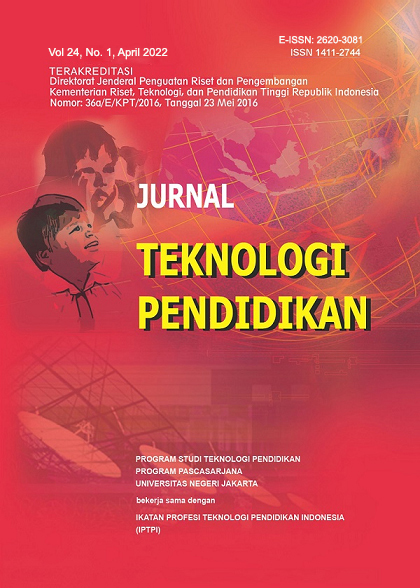Constructivistic-Based of Local Content Learning Model Design at SD Kristen Makale 1, Tana Toraja Regency
DOI:
https://doi.org/10.21009/jtp.v24i1.26634Keywords:
Local content Toraja Culture, Learners, Online Learning, ConstructivismAbstract
Local content learning in primary schools is very important.
However, conditions during the COVID-19 pandemic require learning to be carried out from home.
The purpose of this study is to design a local content learning model for Toraja Tallulolona culture in elementary schools based on constructivist networks. This research applies a qualitative descriptive method. Data obtained by means of (1) carry out learning in class V SD Kr Makale 1, (2) observing the implementation of local content learning Toraja Tallulolona Culture in the network, (3) do FGD. Data analysis was carried out qualitatively (1) identify learning components, (2) discussion of learning components, (3) drafting a learning model, (4) describes a learning model in the Constructivistic-based Toraja Tallulolona cultural local content network. The learning model designed, increases the learning motivation of Class V SD Kr. Makale V.
References
Alawiyah, F. (2013). Peran guru dalam kurikulum 2013. Jurnal Aspirasi, 4(1), 65-74.
Allen, J., & Shockley, B. B. (1998). Potential engagements: Dialogue among school and university research communities. In B. S. Bisplinghoff & J. Allen (Eds.), Engaging teachers: Creating teaching/researching relationships (pp. 61-71). Portsmouth, NH: Heinemann.
Ardiansyah, J. (2013). Peningkatan kompetensi guru bidang pendidikan di Kabupaten Tana Tidung. EJournal Pemerintahan Integratif, 1(1), 38-50.
Borko, H., & Whitcomb, J. A. (2008). Teachers, teaching, and teacher education: Comments on the national mathematics advisory panel’s report. Educational Researcher, 37(9), 565–572. https://doi.org/10.3102/0013189X08328877
Bullough, R. V., & Pinnegar, S. (2001). Guidelines for quality in autobiographical forms of self-study research. Educational Researcher, 30(3), 13–21. https://doi.org/10.3102/0013189X030003013
Burgener, L. & Barth, M. (2018). Sustainability competencies in teacher education: Making teacher education count in everyday school practice. Journal of Cleaner Production, 174, 821-826. https://doi.org/10.1016/j.jclepro.2017.10.263
Chatib, M. (2014). Gurunya Manusia. Bandung: Mizan Pustaka.
Cheruvu, R. (2014). Focus on teacher as researcher: Teacher educators as teacher researchers: Practicing what we teach. Childhood Education, 90(3), 225–228. http://doi.org/10.1080/00094056.2014.911636
Clayton (Missouri) Research Review Team: Beck, C., Dupont, L, Geismar-Ryan, L, Henke, L, Pierce, K. M., & Von
Leonard. (2018). Task and forced instructional strategy: Instructional strategy based on character and culture of Indonesia nation. Formatif: Jurnal Ilmiah Pendidikan MIPA, 8(1), 51–56. http://dx.doi.org/10.30998/formatif.v8il.2408
Downloads
Published
How to Cite
Issue
Section
License
Jurnal Teknologi Pendidikan is an Open Access Journal. The authors who publish the manuscript in Jurnal Teknologi Pendidikan agree to the following terms.
Attribution-ShareAlike 4.0 International (CC BY-SA 4.0)
-
Attribution — You must give appropriate credit, provide a link to the license, and indicate if changes were made. You may do so in any reasonable manner, but not in any way that suggests the licensor endorses you or your use.
-
ShareAlike — If you remix, transform, or build upon the material, you must distribute your contributions under the same license as the original.
- No additional restrictions — You may not apply legal terms or technological measures that legally restrict others from doing anything the license permits.
Notices:
- You do not have to comply with the license for elements of the material in the public domain or where your use is permitted by an applicable exception or limitation.
- No warranties are given. The license may not give you all of the permissions necessary for your intended use. For example, other rights such as publicity, privacy, or moral rights may limit how you use the material.








